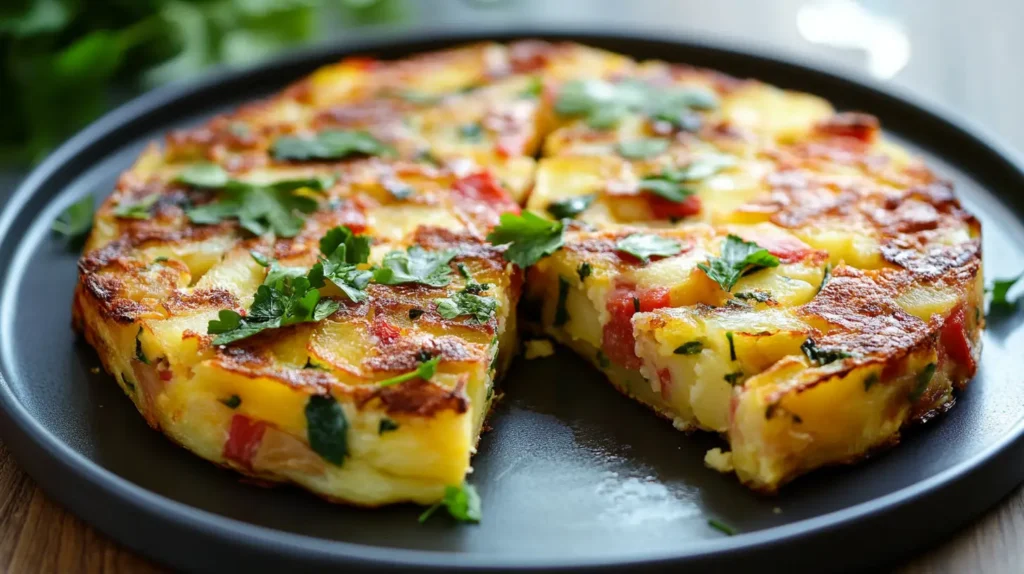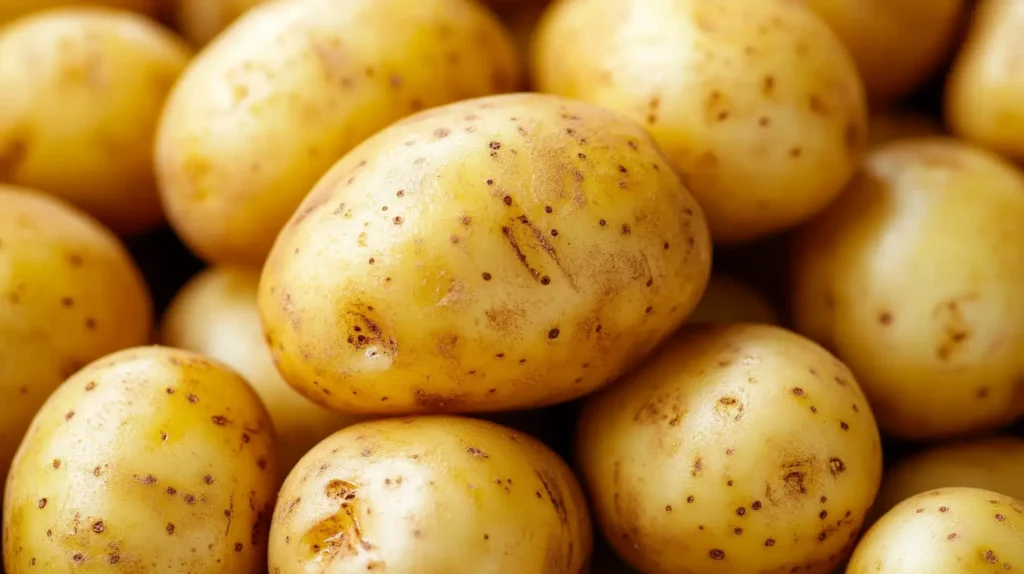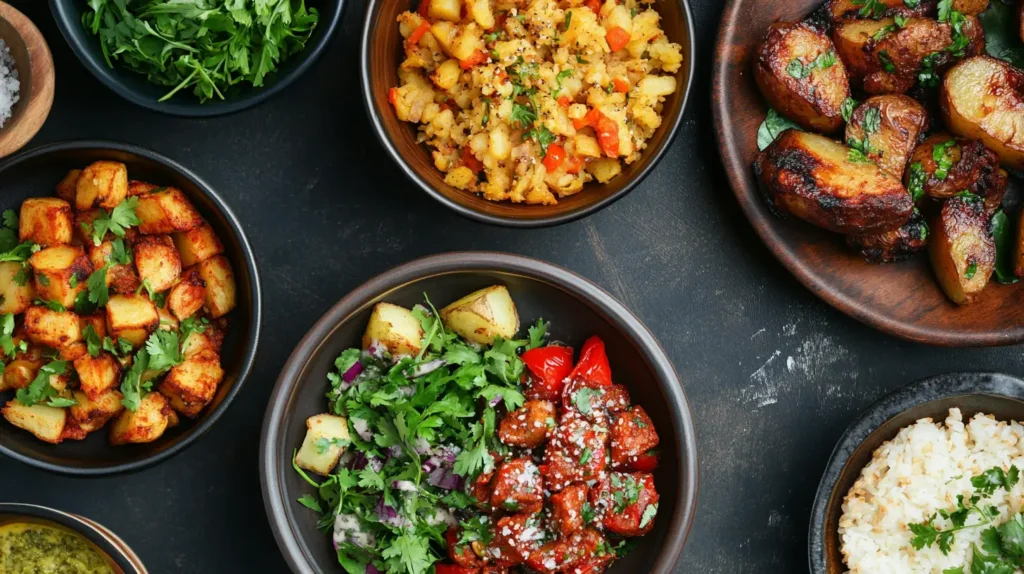Introduction to Fasting Recipes with Potatoes
Fasting is a timeless tradition observed across cultures and religions, often as a practice of spiritual reflection, discipline, or health improvement. While the rules and types of fasting vary, the underlying principle is consistent: consuming simple, nourishing foods that provide energy without overindulgence like Fasting Recipes with Potato.

Among the most versatile and beloved ingredients for fasting is the potato. This humble root vegetable has earned its place in fasting diets due to its ease of preparation, wide availability, and nutritional value. Potatoes serve as a satisfying staple, offering essential nutrients like complex carbohydrates, vitamins, and minerals that help sustain energy levels during periods of restricted eating.
Whether you’re following religious fasting guidelines or adopting intermittent fasting for health reasons, potatoes can be the cornerstone of creative and delicious meals. From traditional recipes like Jeera Aloo to modern takes like baked potato wedges, the possibilities are endless. This guide explores how to make the most of potatoes during fasting, ensuring your meals are both nutritious and flavorful.
Why Are Potatoes Perfect for Fasting Recipes?
Potatoes are a powerhouse of nutrition and energy, making them a popular choice during fasting periods. Here’s why they are an excellent option:

- Rich Source of Carbohydrates
- Potatoes are packed with complex carbohydrates that provide a slow and sustained release of energy, perfect for fasting when meal frequency is reduced.
- Their carbohydrate content helps maintain energy levels throughout the day, keeping fatigue at bay.
- Nutrient-Dense Profile
- Loaded with vitamins like B6, which supports brain function, and vitamin C, which boosts immunity.
- High potassium content helps balance electrolytes, a critical factor during fasting.
- Versatility in Preparation
- Potatoes can be baked, boiled, sautéed, or mashed to create a variety of fasting-friendly recipes without compromising on taste or nutrition.
For sustainable meal inspiration, consider the Wallace Diet Sustainable Weight Loss approach, which emphasizes nutritious and balanced food choices.
Health Benefits of Fasting Recipes with Potato
Potatoes are a cornerstone ingredient in fasting diets, offering a variety of health benefits that complement the discipline of fasting. They not only provide essential nutrients but also support energy levels and digestion, making them an ideal choice for fasting meals.

Energy-Boosting Properties of Potatoes
- Rich in Complex Carbohydrates
Potatoes are packed with complex carbohydrates that provide a slow and sustained release of energy. This ensures you remain active and alert throughout the fasting period, even with reduced meal frequency. - High in Potassium
The potassium in potatoes helps maintain electrolyte balance, which is critical during fasting when salt and hydration levels may fluctuate. This balance prevents fatigue and keeps you energized. - Calorie-Efficient
Potatoes are nutrient-dense but relatively low in calories, offering an energy boost without excessive calorie intake, aligning perfectly with the goals of fasting.
Digestive Benefits of Potato-Based Fasting Dishes
- Rich in Dietary Fiber
The fiber content in potatoes supports healthy digestion by promoting regular bowel movements. This is particularly beneficial during fasting when dietary diversity may be limited. - Gentle on the Stomach
Potatoes are easy to digest, making them a soothing option for fasting diets. Their neutral taste and texture are less likely to cause irritation or discomfort. - Aid in Gut Health
Potatoes contain resistant starch, which acts as a prebiotic, fostering healthy gut bacteria. A healthy gut can enhance overall fasting benefits, such as detoxification and improved metabolism.
How Potatoes Help Sustain Energy Levels
- Slow-Release Energy Source
The carbohydrates in potatoes are digested gradually, providing a steady energy supply. This helps avoid the energy crashes that can occur during long fasting periods. - Balanced Blood Sugar Levels
Potatoes have a low-to-moderate glycemic index when prepared correctly, helping regulate blood sugar levels. This prevents sudden spikes or drops, keeping you energized throughout the day. - Hydration Support
Potatoes have a high water content, contributing to hydration during fasting. Proper hydration is essential for maintaining energy levels and overall well-being.
By incorporating potatoes into your fasting recipes, you can enjoy meals that are not only delicious but also packed with health benefits. Their unique properties make them an indispensable ingredient for staying energized, improving digestion, and sustaining overall health during fasting.
Essential Tips for Cooking Fasting Recipes with potato
When preparing potatoes for fasting meals, it’s important to follow specific rules to ensure the dishes align with fasting guidelines. Here are some essential tips:
- Use Fasting-Approved Ingredients
- Replace regular salt with rock salt, as it is traditionally acceptable during fasting.
- Opt for oils like ghee, coconut oil, or peanut oil instead of refined vegetable oils.
- Use spices sparingly; fasting-friendly spices include cumin, coriander, and black pepper.
- Preparation Techniques
- Always peel potatoes before cooking to ensure they are clean and easy to digest.
- Boil potatoes beforehand to reduce cooking time and make them easier to incorporate into recipes.
- Avoid deep frying unless using approved oils, as this may not be permissible in some fasting traditions.
- Creative Pairings
- Pair potatoes with fasting staples like sabudana (tapioca pearls), buckwheat flour, or peanuts for a balanced meal.
- Incorporate fresh herbs like coriander or mint for added flavor and freshness.
For more creative meal ideas tailored for active lifestyles, explore the Roam Diet Recipes.
Fasting Recipes with Potato
1. Traditional Potato Recipes
- Jeera Aloo
- Ingredients: Boiled potatoes, ghee, cumin seeds, rock salt, and chopped coriander.
- Instructions: Heat ghee in a pan, add cumin seeds until they crackle, toss in diced boiled potatoes, and cook until slightly crispy. Garnish with coriander for a simple yet flavorful dish.
- Aloo Sabudana Khichdi
- Ingredients: Soaked sabudana, diced potatoes, roasted peanuts, cumin, and green chilies.
- Instructions: Soak sabudana for 4-5 hours. In a pan, sauté boiled potatoes in ghee, add cumin seeds, green chilies, and sabudana. Sprinkle roasted peanuts for crunch and serve hot.
- Potato Tikkis
- Ingredients: Mashed potatoes, buckwheat flour, green chilies, and rock salt.
- Instructions: Combine all ingredients into a dough, shape into patties, and shallow fry in ghee until golden brown. These tikkis make an excellent snack or main dish.
2. Modern Fasting Recipes
- Potato Pancakes
- Ingredients: Grated potatoes, buckwheat flour, and rock salt.
- Instructions: Mix grated potatoes with flour and salt to form a batter. Cook spoonfuls on a hot griddle with ghee until crispy on both sides. These are perfect for breakfast or a light meal.
- Baked Potato Wedges
- Ingredients: Potato wedges, ghee, rock salt, and black pepper.
- Instructions: Coat potato wedges in ghee, season with salt and pepper, and bake at 200°C (400°F) for 25 minutes. Serve as a healthy snack or side dish.
- Creamy Potato Soup
- Ingredients: Boiled potatoes, coconut milk, rock salt, and fresh herbs.
- Instructions: Blend boiled potatoes with coconut milk to create a smooth soup. Heat gently, season with rock salt, and garnish with fresh herbs like parsley or cilantro for a comforting bowl of goodness.
The Role of Potatoes in Fasting Recipes
Potatoes play a vital role in fasting diets across cultures. Their versatility, nutritional value, and ability to create filling, delicious meals make them a preferred ingredient for fasting recipes. Here’s an in-depth look at why potatoes are indispensable during fasting periods.
Nutritional Benefits of Fasting Recipes with Potato
- Rich Source of Energy
Potatoes are high in complex carbohydrates, providing a steady release of energy throughout the day. This helps maintain stamina during fasting, especially when meal frequency is limited. - Packed with Essential Nutrients
- Vitamin C: Boosts immunity and supports skin health.
- Potassium: Helps regulate blood pressure and maintain electrolyte balance, especially important during fasting.
- Vitamin B6: Promotes brain function and supports energy metabolism.
- High Fiber Content
Potatoes contain dietary fiber, which aids digestion and keeps you feeling full for longer, reducing hunger pangs during fasting periods. - Low in Fat
When prepared correctly (e.g., boiled or baked), potatoes are naturally low in fat, making them a healthy choice for fasting meals.
Why Potatoes Are a Staple Food in Fasting Diets
- Permissible in Many Fasting Traditions
Root vegetables like potatoes are often categorized as “phalahar,” meaning they are allowed during fasting. This makes them a go-to option when grains and lentils are off-limits. - Incredibly Versatile
Potatoes can be transformed into a variety of dishes that align with fasting rules. From savory options like Jeera Aloo and Sabudana Khichdi to snacks like Potato Tikkis, they cater to diverse tastes and preferences. - Easy to Prepare
Potatoes are simple to cook and adapt well to fasting-approved ingredients such as rock salt, ghee, and fasting flours. - Budget-Friendly and Accessible
Potatoes are affordable and readily available, making them an economical option for households during fasting periods.
By incorporating potatoes into fasting meals, individuals can enjoy a balanced diet that is both nourishing and aligned with traditional fasting practices. For more creative and nutritious ideas, explore fasting-friendly recipes like Potato-Based Dishes.
Common Mistakes to Avoid in Fasting Recipes with potato
While potatoes are a versatile and fasting-friendly ingredient, certain mistakes in their preparation can reduce their nutritional benefits or make them unsuitable for fasting. Here are the most common pitfalls to avoid when making potato-based fasting dishes.
Over-Processing Potatoes
- Excessive Peeling and Mashing
- Removing too much of the potato skin can strip away essential nutrients like fiber and potassium. Instead, peel minimally or use smaller, tender potatoes that don’t require peeling.
- Over-mashing potatoes can alter their natural texture, making the dish less appetizing.
- Using Processed Potato Products
- Avoid ready-made mashed potatoes, frozen fries, or potato mixes, as these may contain additives, preservatives, or non-fasting-approved ingredients. Always opt for fresh, whole potatoes.
- Boiling for Too Long
- Over-boiling potatoes can cause them to lose essential nutrients. Boil them just until tender to retain their nutritional value.
Using Non-Fasting Ingredients
- Regular Salt and Spices
- Replacing rock salt with regular table salt is a common mistake. Similarly, certain spices like turmeric and garlic are not fasting-approved in many traditions. Stick to permitted spices like cumin, coriander, and black pepper.
- Packaged Seasonings
- Pre-mixed seasonings may contain ingredients like onion or garlic powder, which are not suitable for fasting. Always check labels or use homemade spice blends.
- Non-Fasting Oils
- Avoid refined or vegetable oils that are not fasting-approved. Use ghee, coconut oil, or peanut oil for a more traditional and authentic preparation.
Excessive Use of Oil or Fats
If frying is necessary, ensure you drain excess oil using paper towels to avoid greasiness and keep the dish healthier.
Deep Frying
While fried snacks like Potato Tikkis are popular, excessive use of oil can make the dish heavy and counterproductive to fasting goals. Opt for shallow frying or baking as healthier alternatives.
Using Too Much Ghee
Ghee is fasting-friendly but should be used in moderation. Overloading your dishes with ghee can add unnecessary calories and compromise the dish’s lightness.
FAQs: All About Fasting Recipes with Potato
Why Is Potato Allowed in Fasting?
Potatoes are considered a fasting-friendly food in many traditions because they are:
- Neutral in Taste and Nature: Unlike grains, potatoes are classified as “phalahar” (fruits and root-based foods), which are permissible in fasting.
- Easy to Digest: Potatoes are light on the stomach and provide sustained energy, making them ideal for long fasting periods.
- Highly Versatile: They can be prepared in numerous ways while adhering to fasting rules, such as boiling, baking, or frying with fasting-approved ingredients.
For more meal inspiration that aligns with fasting rules, explore the Roam Diet Recipes.
Can I Break a Fast with Potatoes?
Yes, breaking a fast with potatoes is a great choice due to their:
- Gentle Impact on Digestion: Potatoes are mild and easy to digest, which is crucial when transitioning from a fasting state to eating.
- Carbohydrate Content: They provide quick energy replenishment, helping stabilize blood sugar levels post-fast.
If you’re exploring sustainable options for healthy eating, learn about the Wallace Diet Sustainable Weight Loss approach.
How to Eat Aloo in Navratri Fast?
During Navratri, potatoes (aloo) can be prepared in various fasting-friendly ways:
- Jeera Aloo: Toss boiled potatoes with cumin seeds, ghee, and rock salt for a simple dish.
- Aloo Sabudana Khichdi: Combine diced potatoes with soaked sabudana and roasted peanuts for a filling meal.
- Potato Tikkis: Mash potatoes with fasting flours like buckwheat, form patties, and shallow fry them in ghee.
Ensure you use permissible ingredients such as rock salt and avoid any non-fasting additives.
What Are Three Things That Are Forbidden During Fasting?
- Regular Salt and Certain Spices: Replace regular salt with rock salt and avoid pungent spices like turmeric and garlic.
- Grains and Lentils: Foods like wheat, rice, and pulses are typically avoided in favor of root vegetables and flours made from nuts or tubers.
- Processed or Packaged Foods: Many contain additives or non-fasting-approved ingredients, so fresh, homemade meals are preferred.
For more ideas about fasting-approved ingredients, refer to Fasting Recipes Essentials.
What Is the Potato Diet Rule?
The potato diet, popularized as a short-term weight-loss regimen, includes:
- Exclusive Consumption of Potatoes: For a set period (usually 3–5 days), only potatoes are consumed.
- Minimal Seasoning: Salt, oil, and condiments are kept to a minimum.
- Portion Control: Potatoes are eaten in limited amounts to control caloric intake.
While this diet isn’t typically part of fasting traditions, it highlights the potato’s versatility as a standalone food source. However, consult a nutritionist before starting any restrictive diet.
Conclusion
Potatoes are a true blessing for fasting diets, offering versatility, nutrition, and flavor in abundance. From traditional recipes like Jeera Aloo and Sabudana Khichdi to modern options like baked potato wedges and creamy potato soup, the possibilities are endless. They not only keep you energized throughout fasting periods but also support digestion and overall health.
By avoiding common preparation mistakes and adhering to fasting guidelines, you can create delicious and satisfying meals that are both nourishing and enjoyable. Let the humble potato transform your fasting experience into a flavorful and fulfilling journey.
Additional Resource
For more inspiration and guidance, explore these external resources that complement your fasting journey:
- Wallace Diet Sustainable Weight Loss Approach
Learn how to incorporate balanced and nutritious ingredients into your daily meals. - Roam Diet Recipes for Active Lifestyles
Discover recipes that are both healthy and delicious, tailored to maintain energy and vitality. - Vrat-Friendly Recipes for Fasting
Explore creative meal ideas that follow traditional fasting rules and elevate your dining experience.
These resources offer additional insights and recipes to ensure your fasting days are both nourishing and enjoyable.

